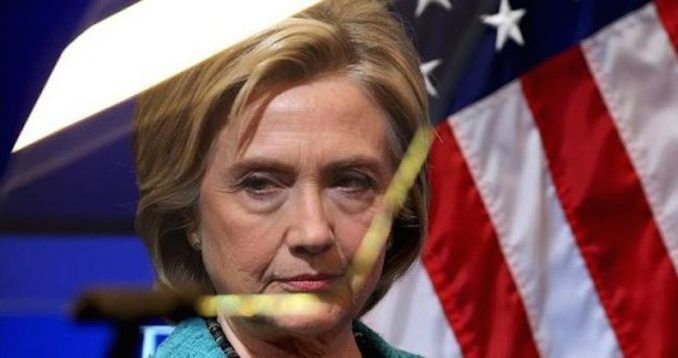
When Americans vote in November they will be voting to keep their most disliked candidate out of office rather than voting to elect a President, such is the deep unpopularity of the two nominees, Clinton and Trump.
How did this happen? The New York Times just accidentally proved the illegitimacy of US democratic elections when they published an interesting analysis on Monday showing only 14% of eligible voters actually voted for the two nominees combined.
This figure might seem staggeringly low, but The New York Times points out that the turnout in this years primary elections is nearly identical to recent primaries. A very low percentage of citizens choosing who will eventually claim to have won a popular vote is actually nothing new.

BYPASS THE CENSORS
Sign up to get unfiltered news delivered straight to your inbox.
You can unsubscribe any time. By subscribing you agree to our Terms of Use
Today's paper, an unintentional reminder to look at third party candidates like @GovGaryJohnson or @DrJillStein. pic.twitter.com/vC6KnbIq7h
— Edward Snowden (@Snowden) August 1, 2016
AntiMedia report:
The United States is supposed to be a democratic republic where the entire population is represented by people elected to do their bidding. But how can politicians claim to have a legitimate mandate to create laws that affect the entire population when they are put in place by a fraction of said population?
General elections, though, historically attract more voters than primaries do. In the 2012 election, President Obama was elected with 51.1 percent of the popular vote, compared to 47.2 for Mitt Romney. But only 57.5 percent of the voting population cast their ballots, meaning President Obama still only secured the votes of 29 percent of voters.
While the media tells a tale of a divided country, wherein 50 percent of the public falls into the Democratic Party and the other half aligns with the Republican Party, the truth is much more concerning. The U.S. government is elected by a handful of dedicated partisan voters, and disenfranchised non-voters often have that minority’s opinion forced onto them. This isn’t democracy, it’s rule by the minority. But it gets worse.
A new poll from Pew Research Center shows the most ardent voters are not necessarily proud of their own party’s platform; rather, they are simply more scared of the other party’s.“In other words, a voter’s dislike of others is a greater driving force in politics than their affinity for their own party. As the Pew survey found, ‘those who associate three or more negative traits with people in the opposing party (as 37% of Democrats and 44% of Republicans do) participate in politics at the highest rates.’”
This trend can basically explain the entire 2016 presidential election so far. But it still gets even worse.
Regardless of whether or not hyper-partisans’ candidates of choice win or lose, those politicians rarely actually represent their views — nor do they care to. Rather, as a 2014 Cambridge University study, often referred to as the “oligarchy study,” concluded, “economic elites and organized groups representing business interests have substantial independent impacts on U.S. government policy, while average citizens and mass-based interest groups have little or no independent influence.” This research reinforces a recent Boston Globe article entitled, “Vote all you want. The secret government won’t change.”
This brings us to the final question: are voters to blame for their lack of participation?
No, they are not. It’s not the public’s fault for becoming disillusioned with a system that has forgotten them. All the votes in the world would not have stopped the DNC from tampering with the 2016 primary, and nearly all the candidates who are legitimately elected by voters don’t bother listening to them once they get to Washington, anyway.
We don’t have a democratic system anymore. We have a government made up of politicians who were elected by a small minority of hyper-partisan voters, and that political apparatus rules in the interests of an even smaller minority of hyper-rich elites. The fact that American politicians cannot inspire an actual majority to vote for them renders the current elections illegitimate.
At this point, a protest non-vote or voting third-party is more effective than an angry partisan vote because you are sending a clear message that the majority does not consent to our supposed mandated rulers.
Now it’s time for the people who didn’t vote for the politicians in power to have their representation.
And about that timeless saying, “If you don’t vote, you have no right to complain” — perhaps the opposite is true.


